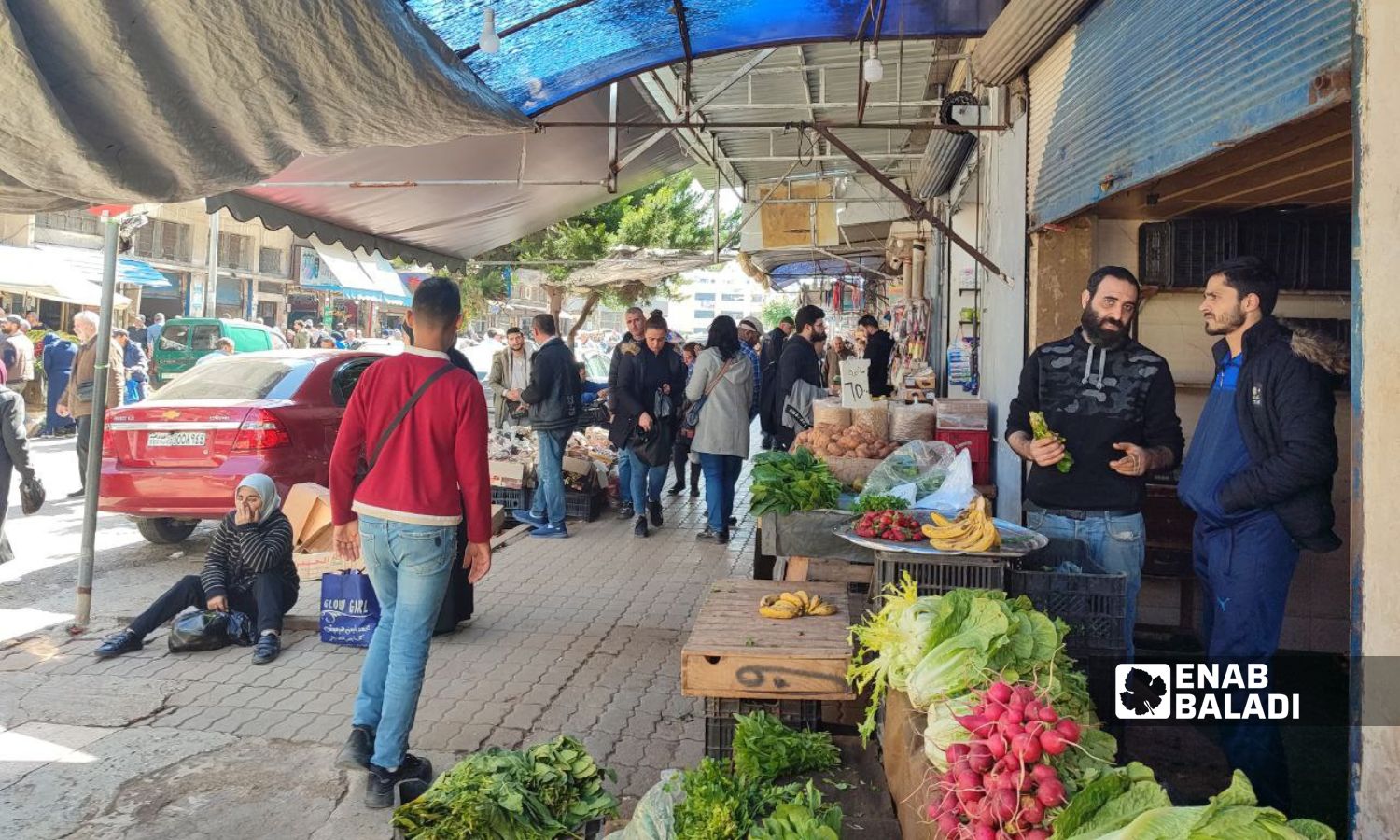



The Syrian pound’s rise in value against the US dollar has not been reflected in prices in Latakia, which have remained high despite the dollar’s drop to 13,850 Syrian pounds yesterday, Thursday, March 14, after reaching more than 15,500 Syrian pounds during the past February.
During a tour Enab Baladi’s correspondent conducted in the markets of the cities of Latakia and Jableh, it was found that the prices of grains and legumes remain unchanged, with the price of a kilogram of bagged rice costing 17,000 Syrian pounds and between 15,000 and 16,000 Syrian pounds for the loose sale. A kilogram of lentils for soup in sealed packs is 24,000 pounds and loose for 22,500 pounds, bulgur is between 12,000 and 13,500 pounds per kilogram, and dry beans range from 34,000 to 40,000 pounds.
Vegetable prices, however, have seen a significant increase. Potatoes are priced at 9,500 pounds for the imported Egyptian type and 8,500 pounds for the good Syrian variety, while the lower quality type drops to 6,500 pounds. The price of green beans, currently in season, ranges from 7,000 to 9,000 pounds, and tomatoes are between 7,000 and 8,000 pounds.
Fruit prices have remained high in general, with apples ranging from 7,500 to 12,000 pounds depending on their quality and place of sale, bananas between 18,000 and 23,000 pounds, while oranges remain the least expensive ranging from 3,500 to 5,000 pounds.
Meanwhile, chicken prices have recorded another record increase. The price of chicken per kilo went from 35,000 pounds a few days before Ramadan to 40,000 pounds before the end of the first week of the month, while the prices of beef and sheep meat remained the same, with cow meat priced between 150,000 and 175,000 pounds, and sheep between 175,000 and 200,000 pounds.
Samer (30 years old), the owner of a supermarket in the al-Raml al-Shamali neighborhood in Latakia, said that he cannot reduce his prices unless the companies he buys from lower theirs.
He added that none of the representatives of those companies reduced their prices, but most of the companies announced certain offers, meaning they give a free amount determined by the percentage depending on the quantity the store seller purchases.
A representative of one of the food companies that produce legumes and grains in Latakia, who preferred not to be named, blamed the wholesale and retail sellers for not reducing the prices.
He added that most companies made good offers without reducing prices out of fear that the dollar price might rise again, given that the market is unstable, with expectations that the dollar will rise significantly after Eid al-Fitr.
The representative gave an example, stating that he sold 100 kilograms of rice to a wholesale merchant at the usual price and gave him an additional offer of five kilograms of rice for free. He added that this offer could have reduced the price by at least a minimum of 1,000 pounds per kilo, but the merchants benefit from the free amount by selling it at the same price without reducing their prices.
He affirmed that most companies offered different deals to the merchants, and as representatives, they communicate with each other to understand how to sell under the currently unstable market conditions.
The representative pointed out that lowering prices currently requires supply control, which is unavailable. If it were, merchants would immediately lower their prices, he said.
According to a previous report prepared by Enab Baladi about the disparity in commodity prices in Latakia and the absence of control, shop owners in the markets of Latakia are not afraid of supply control and are often content with the supply controller taking a bribe and allowing the sellers to determine their prices as they wish.
Residents in Syria live in a deteriorating economic and living reality, with the minimum government salaries in areas controlled by the regime at about 279,000 Syrian pounds (one US dollar equals 13,850 Syrian pounds), while the average cost of living exceeds 10.3 million Syrian pounds, and the minimum living cost is 6.5 million Syrian pounds.
if you think the article contain wrong information or you have additional details Send Correction